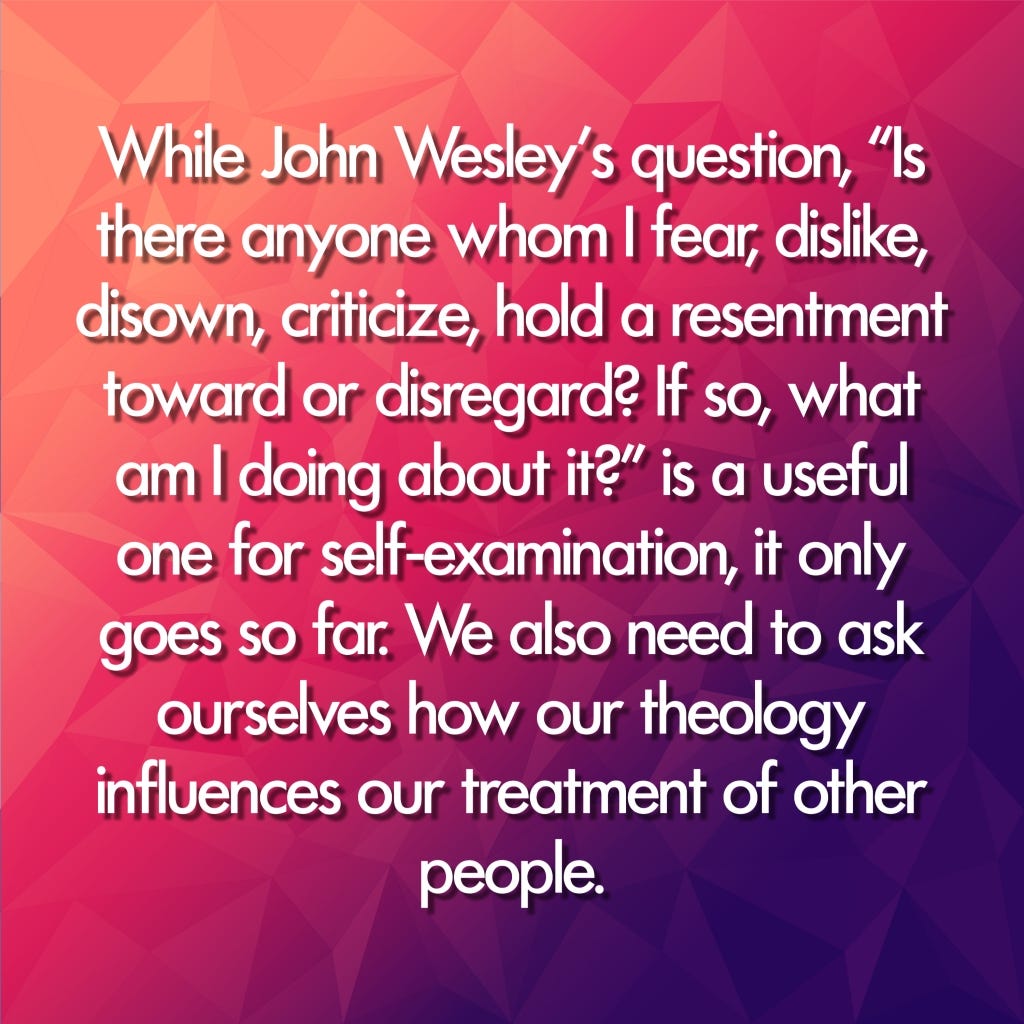Day 20: The Link Between Beliefs and Actions
#RethinkChurch is doing a 22-day journey for self-reflection based on John Wesley’s 22 questions. I am composing short blog posts addressing each question. I am using these posts to encourage Christians, especially Progressive and Mainline Christians to reflect deeply on what it means to be Church in a world marred by oppression and violence.
Day 20: Is there anyone whom I fear, dislike, disown, criticize, hold a resentment toward or disregard? If so, what am I doing about it?
I am taking this post in a little bit of a different direct. I want to focus on how theology impacts who we dislike, disown, criticize, etc. I argue that how you depict God influences how you treat others.
Growing up in a Fundamentalist/Charismatic tradition God was loving but also angry and vengeful. On the one hand God loved humanity so much that God, through the person of Jesus Christ was crucified and resurrected to save us from an eternity in hell. On the other hand, God had no qualms about sending people to hell in the first place. And the list of those going to hell was long: atheists, agnostics, non-Christians, those who belonged to the “wrong church,” those who claimed to be Christian but reject a long list of theological beliefs, in addition to the “standard” sinners (if they did not repent): murders, adulterers, liars, thieves, members of the LGBTQ community, people who had an abortion (and yes all these “sins” were lumped together as equivalent).
We were told that God was someone we could turn to in our darkest moments, but God was also someone that we should fear. I remember being terrified that the “rapture” would occur when I least expected it. What if I sinned right before the rapture occurred and did not have time to ask for forgiveness? What if I believed I was saved, but in fact I was wrong? Would I get left behind? What about my friends and family? What about all the other people that would be forced to live through the horrific tribulation?
My relationship with God was dominated by fear. I loved God, but God also scared me. For someone who was already prone to anxiety, I was terrified that I would make a mistake that would render me unable to enter heaven. I knew that as a sinner I could never be perfect and I could never earn grace, but the list of things I needed to do or avoid, in practice made it appear as if I needed to be perfect to avoid an eternity of torment.
This fear, needless to say, inspired both a zealous desire to convert other people, and also a judgmental attitude towards others. Technically, only God could judge a person’s soul, but that didn’t stop me or other members of the congregation from trying to decipher whether someone was saved or not. Everyone was judged according to our standards. People that attended Mainline Churches? They are on thin ice, theologically speaking. People who drank, listened to secular music, went to movie theaters, etc were not following God’s rules. (At least that’s what the church officially taught…how individuals actually behaved was a different matter).
This type of theology based on fear and judgement can encourage all types of harmful and hateful actions. Take for example parents that that use religion to justify disowning their LGBTQ+ family members. Or what about the discourse surrounding Muslims? The racist and Islamophobic language used to justify the exclusion of refugees/immigrants from Muslim majority countries is often wrapped up in religious language.
“We are a Christian nation!” shout politicians that also advocate for endless wars, torture, the separation and caging of migrants, cutting food stamps, slashing programs that help the poor, etc. These actions only make sense when you have a particular vision of God based on anger, hatred, and fear.
While John Wesley’s question, “Is there anyone whom I fear, dislike, disown, criticize, hold a resentment toward or disregard? If so, what am I doing about it?” is a useful one for self-examination, it only goes so far. We also need to ask ourselves how our theology influences our treatment of other people. If our theology tells us its ok to hate people because of their religious beliefs or lack thereof, their skin color their gender identity or sexual orientation, then our theology needs to change.
If our depiction of God makes it ok to advocate policies that actively causes the suffering and death of society’s most vulnerable, than we need to reconsider what type of God we want to worship.
Day 1: Illusions of Perfection
Day 2: The Dangers of Embellishment
Day 3: Loose Lips Sink Ships or Silence Kills?
Day 5: The Oppression of Professionalism
Day 6: Mental Illness and Distorted Thinking
Day 8: Making Sense of the Bible
Day 9: Praying to Cosmic Santa Clause
Day 10: The Importance of Talking…and Listening
Day 11: The Necessity of Economic Justice
Day 12: The Sacredness of Rest
Day 13: Obeying the Greatest Commandments
Day 15: For the Brokenhearted…
Day 16: Jealousy, Anger, and Viciousness on Social Media
Day 17: Spending Time with God



